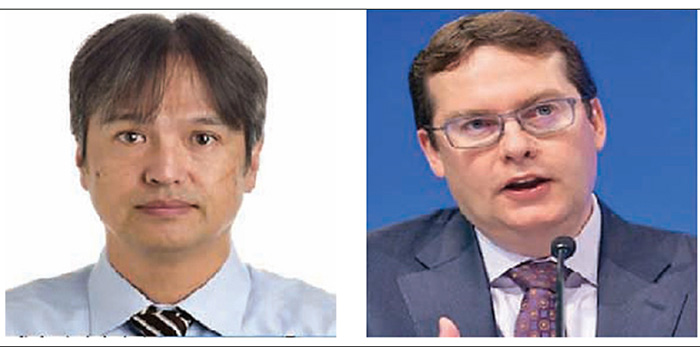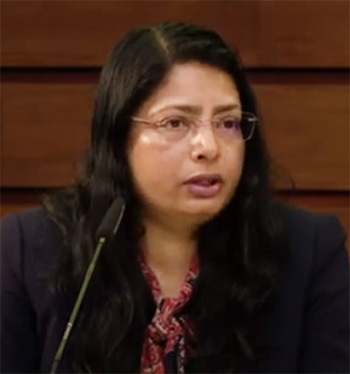BUSINESS
IMF Mission disagrees with widespread notion of ‘IMF-imposed fiscal consolidation for Sri Lanka’

Masahiro Nozaki and Peter Breuer
By Sanath Nanayakkare
The International Monetary Fund (IMF) mission led by Peter Breuer and Masahiro Nozaki that conducted a staff visit to Colombo from May 11 to 23, 2023 took issue with the widespread notion of ‘IMF-imposed fiscal consolidation measures for Sri Lanka’ at a Newsline TV programme hosted by Sirasa TV on Tuesday.
Disagreeing with a query on whether ‘IMF-imposed’ fiscal consolidation measures made matters worse for Sri Lanka, Peter Breuer said,” I take slight issue with your mention of IMF-imposed fiscal consolidation measures for Sri Lanka because what was the alternative if there weren’t an IMF programme for Sri Lanka and we intervened in the crisis at the request of the government of Sri Lanka,” he said.
“The IMF provides financing to support the government to reduce the amount of money it needs to find in the market which leads to even higher interest rates. Or it needs to get it from the Central Bank which leads to ever-increasing inflation which everyone is already feeling at their purse strings. Or it needs to reduce its expenditure and consolidate on the expenditure side. All three of these options are not desirable options for Sri Lanka. And by providing some financing, the IMF has cushioned the blow this crisis is dealing to Sri Lanka. And at the same time, the IMF programme commits the government to a credible set of reforms that help the country emerge from this crisis in a sustainable way,” he argued.
When a follow-up query was posed at him saying,” So wasn’t it really IMF-imposed.? Didn’t the IMF tell the government if you want our money this is what you have to do. You make the decision if you want to take it or leave it,” to which Peter Breuer replied,” We don’t approach negotiations like that. We engage in a dialogue with the authorities. We listen to the constraints they have because they know about the Sri Lankan economy that we don’t know about. And at such conversations, beneficial solutions emerge with the input of all sides, namely; the IMF, the government of Sri Lanka, other experts and stakeholders whom we consult throughout our missions in Sri Lanka who bring to the table different perspectives and different ideas that matter for the programme.”
Further speaking Peter Breuer said:
“Why is there consolidation in such terrible crisis? Essentially when you are out of buffers, you have no other choice. There is nothing you can turn to get out of the crisis. You have very few options because accessing the capital markets when debt is not sustainable is impossible. So in order to gain back the confidence of the markets to lend to you again and to bridge such a difficult situation you need to take that first step and start restoring fiscal balance,”
“It’s unfortunate that people will only lend to you when things are looking better except for the IMF that is here to help Sri Lanka in the rest of the times .”

Sarwat Jahan
” When things start getting better, when creditworthiness of the country improves, it should then be a lot easier to access markets again to avoid an overly tightening fiscal situation which has harmful impact on the population.”
“There are plenty of examples for successful IMF programmes where countries committed themselves to the reforms that were supported by the IMF. I myself was resident representative in Ireland when they faced a crisis. I recognize the fact that it’s a different economy. But Ireland committed to very strong reforms and was very serious about ownership and implementation. Those were really key parts of the reform programme in Ireland. They stuck to an ‘under promise- over deliver’ reform framework that generated positive surprises. That really helped Ireland regain confidence of the markets and of the people which resulted in progressive outcomes. There are plenty of other examples of successful IMF-supported programmes in the world,” he said.
When asked about the checks and balances of the programme in Sri Lanka, he said,” There are regular reviews that take place twice a year. First review is to take place around September /October 2023 when we come back and formally consult with the authorities, At that point we will see how things are going relative to what has been agreed and there will be another review six months later. We are in constant contact with the authorities. Our resident director’s daily life is about that. We have continuous video conferences with the authorities. And periodically we come for visits that are not tied to the formal reviews, but in a more informal way of catching up with the authorities. That is the purpose of our current visit in Sri Lanka,” he said.
Sarwat Jahan, Resident Representative in Colombo noted that the IMF was there to clarify on what the Fund can do, but more so what Sri Lankans as a nation can do to put the country back on its track.
“This crisis is quite deep. It is a combination of economic crisis and a humanitarian crisis. Sri Lanka had never faced debt sustainability issues before. This is the first time Sri Lanka has announced a moratorium on its debt service. So the situation is actually quite grave and it is going to take quite a bit of effort on all stakeholders to bring Sri Lanka back to its growth potential. So, for Sri Lanka as a whole the main part is to recognize how deep the crisis is and then all Sri Lankans need to contribute to the recovery which means taking ownership of the deep reforms that are needed. These reforms include tax reforms, SOE reforms and structural reforms – things that can help build entities and institutions. In addition to it, ensuring the independence of the Central Bank and dealing with anti-corruption issues will be important. So in my view, Sri Lanka has to take a holistic approach in meeting key commitments under the Fund-supported programme,” she noted.

